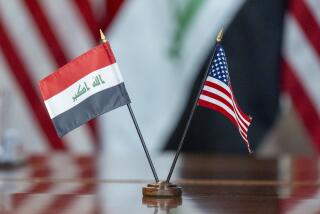Suicide bomber attacks Iraqi soldiers in Anbar province
- Share via
BAGHDAD — A suicide bomber wearing an explosives vest penetrated a fortified Iraqi army base in Anbar province Thursday, attacking as soldiers gathered for lunch, but it was unclear whether anyone other than the bomber was killed.
The Interior Ministry in Baghdad initially reported 16 deaths and 50 injuries, but Defense Ministry and Anbar police representatives contradicted the information, saying there were no soldier or civilian deaths. As many as several dozen people were injured, the officials said.
It is common in Iraq to receive contradictory information about casualties in the initial hours after an attack, though such a major discrepancy is unusual. A spokesman for U.S. Marines in Anbar declined to comment.
An Iraqi soldier who said he witnessed the attack said at least 16 of his comrades were killed and many more injured about noon in the packed cafeteria of the Taqaddum base near the town of Habbaniya, 40 miles west of Baghdad.
The soldier, who refused to be named, accused high-level officers of “trying to cover this up in order to avoid giving an image of underachievement.”
The attack was the latest in a string of bombings in Iraq in recent weeks that have raised concerns that the insurgency is recovering its strength after months of relative calm. Security forces are under intense pressure to show success.
The attack on the army base, in a province that had been regarded as pacified, was a serious breach of security. A police official in the provincial capital, Ramadi, said it appeared the bomber was wearing the uniform of an army first lieutenant, indicating he may have had inside help.
“We can’t say for sure that someone from inside the base collaborated with the attacker,” said the official, who spoke on condition of anonymity. “We can say it was a security breach. The question is, how did he get in? There are many checkpoints.”
It was the second attack in as many days targeting security forces. On Wednesday, a car bomb in the volatile northern city of Kirkuk killed 10 policemen and injured 22 on a bus.
But Anbar, the former epicenter of the insurgency, is considered by the U.S. military as one of the biggest success stories of the war after Sunni Arab tribal leaders launched the Awakening movement in 2006 and turned against the militant group Al Qaeda in Iraq.
Anbar residents have warned, however, that Al Qaeda in Iraq has maintained sleeper cells that could be activated anytime. Recent attacks in the province have raised fears the group is trying to stage a comeback ahead of the scheduled withdrawal of U.S. forces from Iraqi cities by June.
--
Times staff writer Saif Hameed and a special correspondent in Ramadi contributed to this report.
More to Read
Sign up for Essential California
The most important California stories and recommendations in your inbox every morning.
You may occasionally receive promotional content from the Los Angeles Times.










